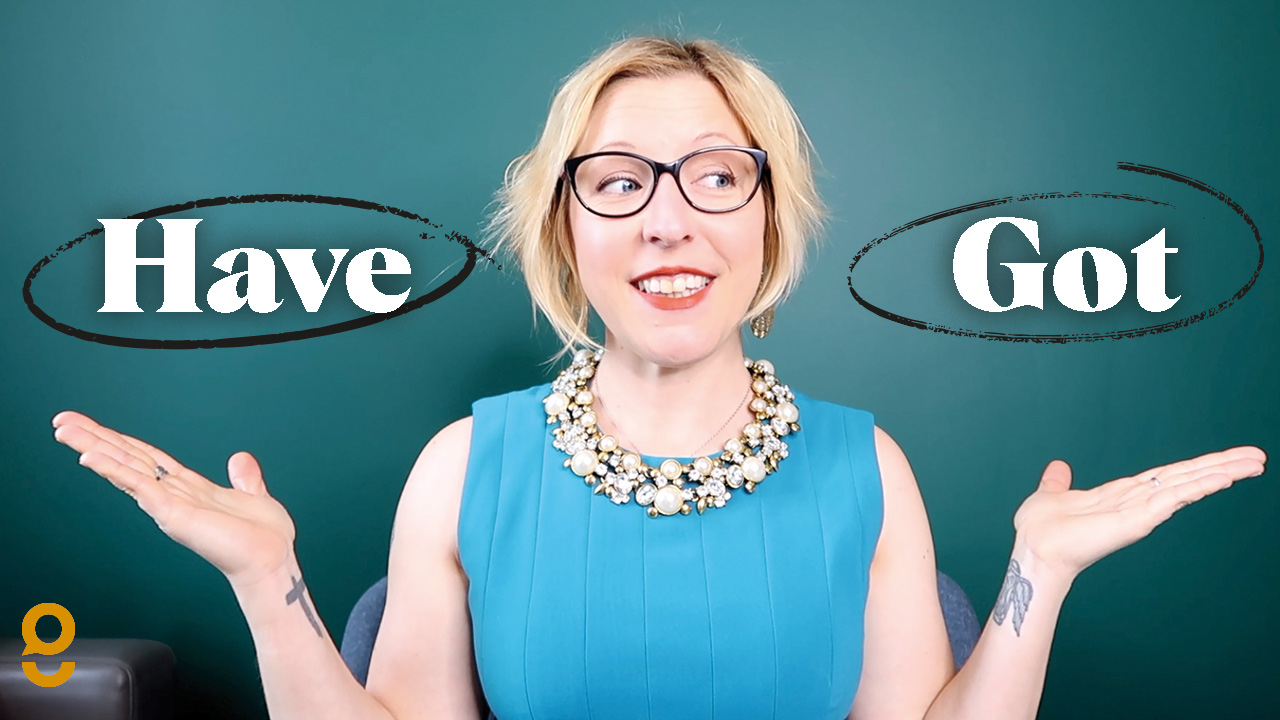
Sometimes it takes just a small change in your English to feel more comfortable, sound more advanced AND understand native speakers better.
In today’s blog post and video lesson, you’ll learn to simplify your English and use have and got the way native speakers do. It’s easier than you think, a lot of fun.
Why should you do that?
Because when you don’t learn how to simplify like native speakers:
- You learn a language in school, and then, when you speak in real life, you make these really long sentences with overly complex words…
- You sound overly formal AND
- You don’t understand native speakers.
Does that sound like you?
Then you need to simplify.
Native speakers use simple expressions when they speak…that you might not know!
Or that you might not be in the habit of using.
Let’s see how this works. I’ve got some examples for you…
Get the worksheet to test what you learn in this lesson!
Did you know that I’ve made a worksheet to go with this lesson so that you can practice everything you see here today? I want you to make this part of the English you actually use in real life!
GET THE WORKSHEET: Make sure you practice these expressions so you can use them in real life with this worksheet made for you by a Neurolanguage coach.
Index:
1. Simplify your English and sound more natural: Use have instead.
2. Simplify your English and sound more natural: Use have to (hafta) & got to (gotta)
3. Hafta, gotta…Imma hafta…when native speakers have conversations! (+ an example)
1. Simplify your English and sound more natural: Use “have” instead.
Here are a few examples.
These are things I hear my clients saying all the time.
They’re not incorrect, they just sound less natural (and advanced) than if you use simple expressions.
“Let me speak with human resources and find a solution.” ⇒
“Let me have a talk with human resources.”
“The price of oil impacts the price of our products.” ⇒
“The price of oil has an impact on the price of our products.”
Also check out my lesson: How to use “kind of.”
2. Simplify your English and sound more natural: Use have to (hafta) & got to (gotta)
One way you can make your English sound natural is to use “have to” and “got to” to express obligation.
It sounds less formal than saying I must…or I’m obliged to! And you’ll notice in speaking we actually say “hafta” and “gotta.”
I run my business in France.
And I know exactly what it’s like to know a word or expression and not understand it when native speakers use it.
One minute you’re laughing with everyone else in the room.
The next minute it seems like the person you are talking to has their mouth full.
You just can’t understand.
And in English–this can happen with expressions pronounced like “hafta” and “gotta.”
GET THE WORKSHEET: Make sure you practice these expressions so you can use them in real life with this worksheet made for you by a Neurolanguage coach.
3. Hafta, gotta…Imma hafta…when native speakers have conversations!
Here’s a conversation showing how native speakers do this:
(To hear how native speakers pronounce these, be sure to watch the video).
Fred: Hey, some of us are going out tonight to that new restaurant.
You have to hafta try the sushi there, it’s great! Wanna come?
Samantha: Oh no–I can’t, I have to hafta work late. I’ve got to gotta get this proposal out before I leave.
Fred: Ok, well, I’ve got to gotta go. Let me lemme know if you change your mind.
Samantha: Yeah, I’m gonna hafta take a raincheck this time I think. But thanks anyway!
And…if you spend plenty of time with ‘real life English speakers,’ You might even hear this:
“I’mma hafta take a rain check.”
What does that mean?
I’m going to have to try that another time.
Also check out my lesson: “Gonna,” “Gotta,” “Wanna”: Everyday contractions in American English
Take the next step: Improve your English in the comments
The best way to become more confident using Business English is to practice!
Here’s your Confidence Challenge for this week:
- In the comments write one example of an expression you could use with ‘have’ to sound more natural in English.
If you learned something from this lesson, please share it with your coworkers & friends. You can send your message to them in English for more practice!
Click here to share this article on LinkedIn
Click here to share this article on Facebook
Become more fluent & comfortable in conversations
If you would like to take the next step with me, discover my Faster Fluency Conversation Club Membership Program!
It helps you become more confident speaking in conversations, and get a lot more vocabulary on many different topics! And it’s a fabulous community of “English buddies” from around the world!
TIP: Use the code FFCC40 to save -40% off your 1st month of membership!
More details at
https://mybusinessenglishcourses.com/faster-fluency-conversation-club/join-now
Can’t wait to see you in the Club,
Christina
More good stuff…
Click the image to learn more








I really hafta simplify the way I speak english. 🙂
And I’mma hafta read english books to help me !
I hafta thank Christina for this new lesson.
You are so welcome, Stéphanie!
Hi Christina
I just Stuart tout follow your podcast… I have to configurate my IPad in english.
It will be more convenient
I think the expression « to take a rani check » means « se prendre une énorme quantité de choses à faire » ?
Best regards
That’s great, I’m glad you are enjoying the podcast! And that’s a good idea to put your Ipad settings in English! As for “take a raincheck”, good guess, but it actually means “to accept an invitation from someone to do something, but at a later date than the one proposed.”
Happy listening and “see” you soon!